Ethical assessments for a privacy-friendly artificial intelligence
DOI:
https://doi.org/10.3989/arbor.2021.802006Keywords:
Artificial Intelligence, privacy, fundamental rights, protection goalsAbstract
For quite some time now, there has been a tendency to claim that the law or different types of standards are not adequate or applicable to the different new technologies that are continuously appearing (cloud computing, big data, the Internet of Things, robots, Artificial Intelligence, etc.). This paper will attempt to turn this reasoning on its head and, focusing on Artificial Intelligence, propose suitable criteria for this technology and many others to be developed and applied appropriately to fundamental rights, in general, and privacy in particular. Within these criteria, an analysis will be made of what the explainability of the aforementioned technology should provide (a requirement introduced by different groups of experts) and some additional concepts, such as the possibility/necessity of controlling (to the point of being able to stop an Artificial Intelligence system at any time) and auditing Artificial Intelligence systems, will be explored in greater depth. In order to carry out the aforementioned in-depth study, we will use what are known as protection goals (availability, confidentiality, integrity, transparency, unlinkability, and ability to intervene) and the principles of Cyberethics, including a special reference to the sustainability and resilience of these types of systems.
Downloads
References
Fernández Durán, Ramón; González Reyes, Luis (2014). En la espiral de la energía. Madrid: Libros en acción.
Mirsky, Yisroel; Mahler, Tom; Shelef, Ilan, and Elovici, Yuval (2019). CT-GAN: Malicious Tampering of 3D Medical Imagery using Deep Learning. Disponible en https://arxiv.org/pdf/1901.03597.pdf [Fecha de consulta: 3 octubre 2021].
Morte Ferrer, Ricardo (2020). Reflexiones sobre las evaluaciones del impacto. Una propuesta para un modelo de Evaluación del Impacto Ético en el ámbito de salud. Dilemata. Revista Internacional de Éticas Aplicadas, 32: 71-82. Disponible en https://www.dilemata.net/revista/index.php/dilemata/article/view/412000351 [Fecha de consulta: 3 octubre 2021]
Riechmann, Jorge (2016). ¿Derrotó el smartphone al movimiento ecologista? Para una crítica del mesianismo tecnológico. Madrid: Los Libros de la Catarata.
Romero Muñoz, Javier (2017). CiberÉtica como ética aplicada: una introducción. Dilemata. Revista Internacional de Éticas Aplicadas, 24: 45-63. Disponible en https://www.dilemata.net/revista/index.php/dilemata/article/view/412000100 [Fecha de consulta: 3 octubre 2021].
Schneier, Bruce (2018). Click Here to Kill Everybody. Security and Survival in a Hyper-connected World. W. W. Norton & Company.
Published
How to Cite
Issue
Section
License
Copyright (c) 2022 Consejo Superior de Investigaciones Científicas (CSIC)

This work is licensed under a Creative Commons Attribution 4.0 International License.
© CSIC. Manuscripts published in both the printed and online versions of this Journal are the property of Consejo Superior de Investigaciones Científicas, and quoting this source is a requirement for any partial or full reproduction.All contents of this electronic edition, except where otherwise noted, are distributed under a “Creative Commons Attribution 4.0 International” (CC BY 4.0) License. You may read here the basic information and the legal text of the license. The indication of the CC BY 4.0 License must be expressly stated in this way when necessary.
Self-archiving in repositories, personal webpages or similar, of any version other than the published by the Editor, is not allowed.
Funding data
H2020 European Research Council
Grant numbers 780073;779982















